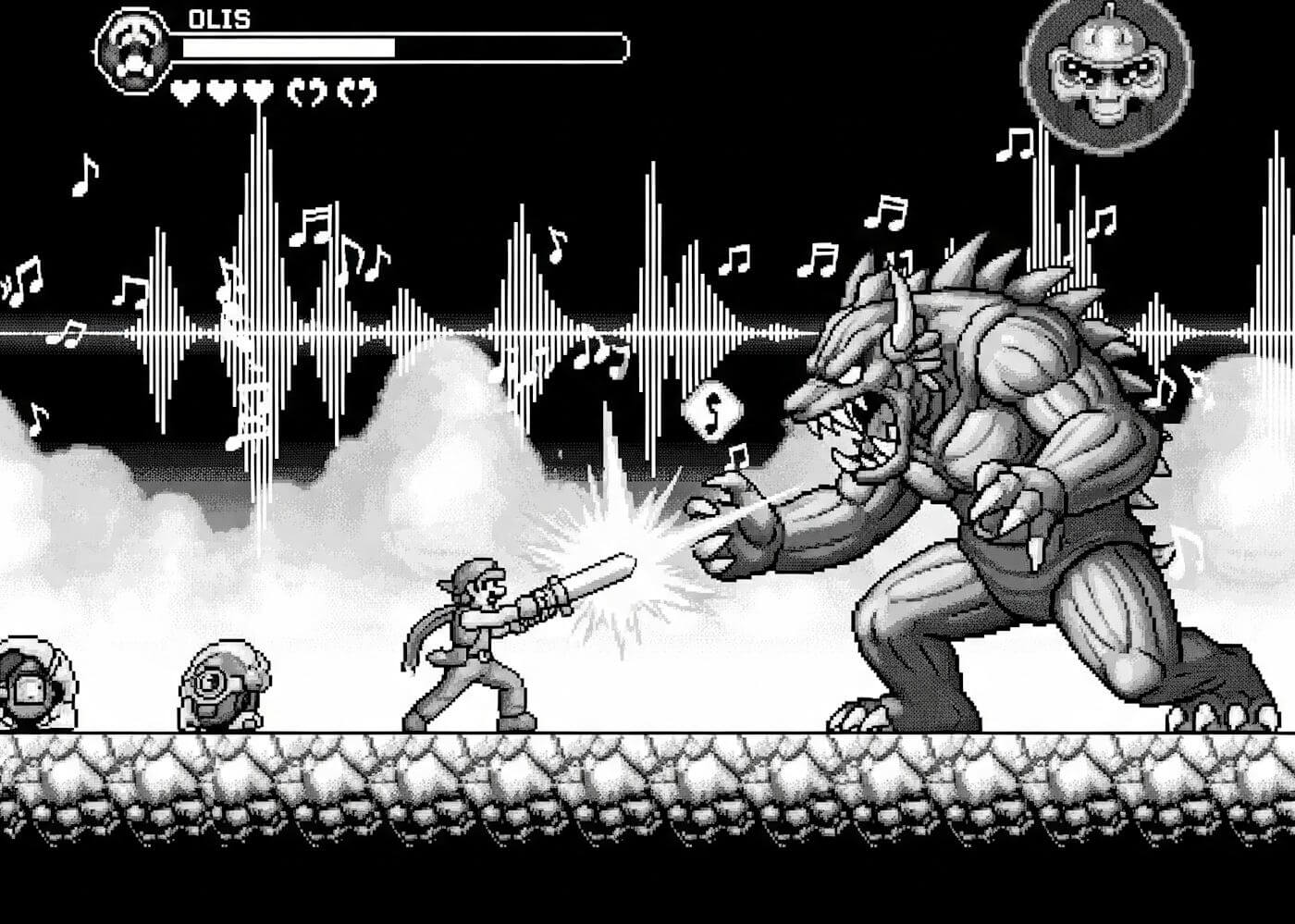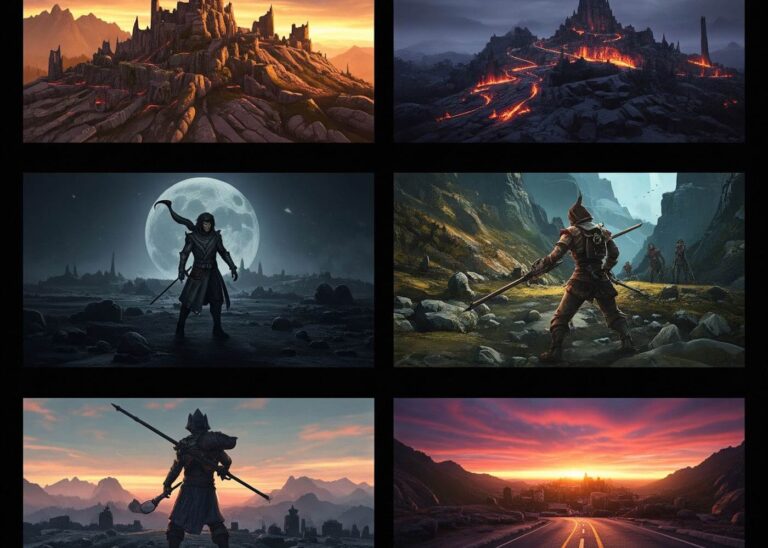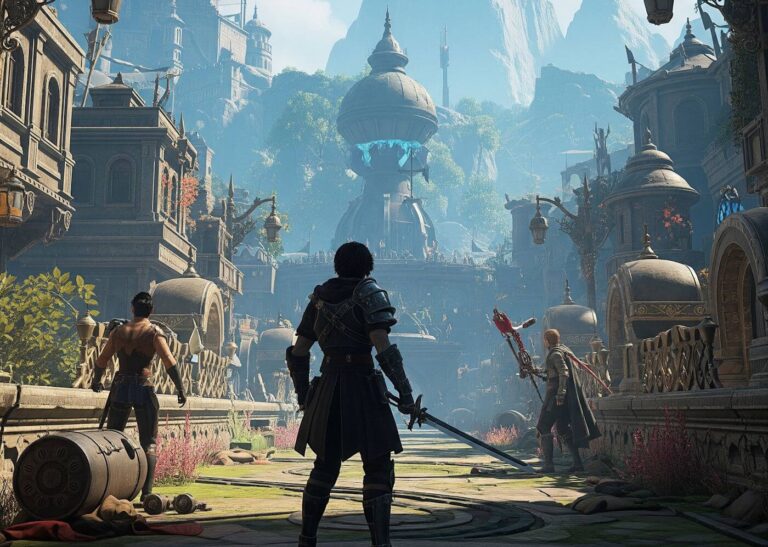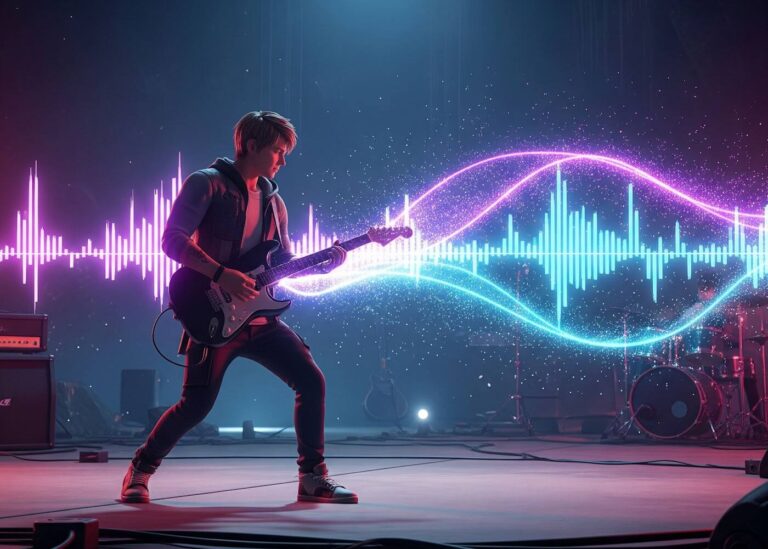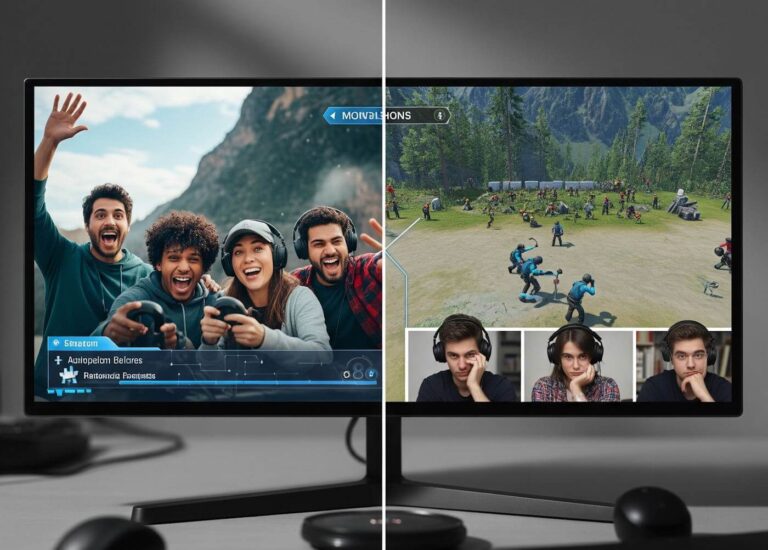Legendary Tracks from Boss Battles You’ll Never Forget
Introduction to Video Game Boss Battle Music
In the realm of video games, boss battles stand as some of the most climactic and memorable moments, enhanced significantly by the incorporation of music. The right soundtrack can elevate the emotional stakes of a confrontation, transforming a simple fight into an epic showdown that resonates deeply with players. Music serves as an integral part of the gaming experience, shaping the ambiance and providing players with an auditory cue that signals the transition into high-stakes gameplay. This unique blend of sound and gameplay amplifies the adrenaline rush, creating a compelling atmosphere that keeps players engaged.
One key aspect of video game music is its ability to forge lasting memories. Players often find themselves recalling specific tracks long after their gaming session has ended. The association of a particular melody with a challenging boss fight can evoke powerful feelings of nostalgia, triumph, or even anxiety. Each note can reflect the character of the boss, whether it be ominous and foreboding or intense and thrilling, immersing players in the emotional depth of the encounter. The combination of visual and auditory stimuli heightens the sense of immersion, allowing gamers to connect with the narrative on a more profound level.
Additionally, the strategic use of music can serve to guide players through complex mechanics during a boss battle. A well-timed crescendo might signal a change in the battle’s dynamics, alerting players to shift their strategies accordingly. In this way, the music not only embellishes the experience but also aids in gameplay, creating a cohesive relationship between sound, action, and storytelling. As such, the significance of music in video game boss battles cannot be understated; it enhances the overall gaming experience, fostering connections and memories that remain long after the challenge has been overcome.
Classic Boss Battle Themes that Defined a Generation
Throughout the history of video gaming, certain boss battle themes have emerged as exemplary representations of their respective titles, resonating with players long after the credits have rolled. Two standout examples are from ‘Final Fantasy’ and ‘Mega Man,’ both of which have solidified their places in gaming history due to their unforgettable musical compositions. These classic boss battle tracks are characterized by their engaging melodies, intricate arrangements, and the ability to elevate the intensity of gameplay.
‘Final Fantasy,’ a franchise revered for its rich narratives and complex characters, features memorable boss themes that have captivated audiences since its inception. The score for ‘Final Fantasy VII,’ composed by Nobuo Uematsu, presents a perfect blend of orchestral elements and electronic sounds. The theme for the iconic character Sephiroth, often cited as one of the best boss themes in gaming, instills a sense of foreboding and urgency, immersing players in the moment. This track not only serves to heighten the emotional stakes of the confrontation but also hints at the character’s depth, allowing the music to provide a greater understanding of the plot’s nuances.
Similarly, ‘Mega Man’ has contributed immensely to the landscape of video game music with its catchy and adrenaline-pumping compositions. The series is renowned for its stage and boss themes, particularly the music of ‘Mega Man 2.’ The track for Dr. Wily’s Castle combines rapid tempos and synthesized sounds, creating a sense of urgency that mirrors the fast-paced gameplay. Its influence is palpable in the video game music of today, where many developers draw inspiration from these iconic tracks. The legacy of these classic boss battle themes remains strong, as they not only defined a generation of players but also set a benchmark for future compositions in the gaming industry.
The Evolution of Boss Battle Music in Modern Games
Boss battle music has undergone a remarkable transformation since the early days of video gaming. Initially characterized by simple 8-bit soundtracks, the music served not only as an audio cue for the gameplay but also as a backdrop to evoke emotions akin to intensity and urgency. The limitations of early consoles meant that composers had to rely on minimalistic tunes to convey the drama of a showdown, often resulting in memorable yet repetitive tracks.
With advancements in technology, particularly in sound production and orchestration, the landscape of boss battle music began to diversify significantly. The 16-bit and beyond eras introduced richer soundscapes and more complex melodies, allowing composers to craft layered compositions that matched the narrative depth of the games themselves. This shift paved the way for the incorporation of orchestral arrangements, as seen in modern titles that utilize full symphonic scores, adding a level of gravitas previously unattainable.
In contemporary gaming, titles like ‘The Legend of Zelda: Breath of the Wild’ and ‘Dark Souls’ exemplify this evolution effectively. ‘Breath of the Wild’ utilizes a subtle and adaptive musical approach, wherein the music dynamically shifts as players traverse different environments or engage in battles. This fluidity not only enhances gameplay but also deepens the player’s emotional engagement with the unfolding story. Similarly, the haunting and intense scores of ‘Dark Souls’ underscore the atmosphere of its challenging encounters, elevating the player’s experience through music that reflects despair, triumph, and tension.
This evolution signifies a broader trend in game design—recognizing the critical role of music as an integral component of storytelling. With today’s technology, composers can create immersive soundtracks that not only accompany the action but also resonate with players’ emotional journeys, thus transforming the entire gaming experience.
Memorable Boss Themes from RPGs and Fantasy Games
Music has an undeniable power to evoke emotions and enhance experiences, especially in interactive mediums such as role-playing games (RPGs) and fantasy titles. Legendary tracks often accompany pivotal boss battles, leaving a lasting impression on players. One such track is “One-Winged Angel” from Final Fantasy VII, composed by Nobuo Uematsu. This orchestral piece combines dramatic symphonies with choral elements, creating a sense of urgency and epic confrontation. The haunting melodies, coupled with the intense battle visuals, captivate players, immersing them deeply into the game’s climax.
Another noteworthy composition is “The Dragonborn Comes” from The Elder Scrolls V: Skyrim. This song not only serves as a thematic element for its iconic Dragonborn character but also becomes a rallying cry during conflicts with dragon bosses. The folk-inspired vocals and instrumentation reflect the rich lore of Skyrim, engaging players on a cultural level. This connection enhances the immersion experience, making the battle feel like a significant moment within a larger narrative.
These tracks, among others, are not merely background scores but are integral to the storytelling process. They heighten emotions and create a profound sense of connection to the characters involved in the struggle. As players confront formidable foes, the combination of compelling gameplay and memorable music translates an ordinary confrontation into a legendary showdown. Ultimately, the effectiveness of boss themes in RPGs and fantasy games is a hallmark of game design, showcasing the integral relationship between music and player engagement.
Challenging Boss Themes that Increase Tension
In the realm of video games, few experiences are as exhilarating and nerve-wracking as engaging in a boss battle. Central to the intensity of these encounters is the music that accompanies them. Compositions from games like Bloodborne and Dark Souls exemplify how meticulously crafted soundtracks can elevate the stakes and immerse players in feelings of dread and urgency.
In Bloodborne, for instance, the soundtrack is characterized by orchestral arrangements that crescendo to create a sense of impending danger. The eerie harmonies and dissonant chords echo the horror themes prevalent throughout the game, intensifying the psychological struggle players face as they confront grotesque foes. The music morphs as players engage in combat, seamlessly transitioning from suspenseful rhythms to frenetic, powerful crescendos that heighten anxiety. This dynamic auditory experience not only amplifies the tension but also influences player performance, often instilling a fight-or-flight response that pushes them to hone their skills under pressure.
Similarly, Dark Souls employs its soundtrack to cultivate an atmosphere of dread that is palpable during boss encounters. The compositions often reflect the characteristics of the bosses themselves, using instrumentation and tempo to illustrate their strength and ferocity. For example, the music during the battle with Ornstein and Smough presents a stark dichotomy: a haunting melody juxtaposed with powerful orchestral strikes that symbolize the relentless nature of this duel. This multifaceted approach not only reinforces the game’s themes of struggle and persistence but also creates a profound emotional connection as players rise to meet the challenge.
Ultimately, the significance of challenging boss themes lies not only in their ability to evoke emotion but also in their impact on gameplay. As players navigate the trials presented by these encounters, the music serves as both a motivator and a formidable adversary, making each victory feel richly earned.
Iconic Tracks from Indie Game Boss Battles
Indie games have continuously pushed the boundaries of creativity and innovation, especially when it comes to their audio experiences. Among these innovations, boss battle music has emerged as a defining characteristic, contributing to the emotional weight of these confrontations and enhancing the overall gameplay experience. Notably, titles such as ‘Hollow Knight’ and ‘Cuphead’ have produced some of the most memorable tracks that resonate deeply with players, elevating the tension and excitement of their respective encounters.
‘Hollow Knight’, developed by Team Cherry, features an exceptional soundtrack that evokes a sense of urgency and emotion fitting for a game set in the hauntingly beautiful world of Hallownest. The tracks, composed by Christopher Larkin, incorporate a blend of orchestral themes and ambient sounds that mirror the intricate artistry of the game. Particularly during boss encounters, the music shifts to more intense and dynamic compositions, allowing players to fully immerse themselves in the experience. The music serves not just as an auditory backdrop but as an emotional narrative that enhances player engagement against formidable foes.
In contrast, ‘Cuphead’ offers a psychedelic, jazz-infused soundtrack that complements its 1930s cartoon art style. Composed by Kristofer Maddigan, the music serves to amplify the game’s whimsical and frantic nature, particularly during intense boss battles. Each track blends energetic rhythms with catchy melodies, pulling players into the challenging yet playful atmosphere. The musical styles employed in ‘Cuphead’ demonstrate how indie game developers often harness historical influences to create unique soundscapes, perfectly timed to heighten the stakes during pivotal moments.
These exemplary tracks from indie games illustrate how music can serve as a vital storytelling element, transforming boss battles into unforgettable experiences. Both ‘Hollow Knight’ and ‘Cuphead’ exemplify the art of crafting soundscapes that reflect the creative visions of their developers while solidifying their places in the annals of gaming history.
How Boss Battle Music is Composed
In the realm of video game music, the composition of boss battle themes occupies a unique and pivotal role. Composers specializing in this genre must skillfully balance the need for intense, action-driven melodies with the emotional weight of the gameplay experience. The collaboration between composers and game designers is essential to create an immersive audio-visual synergy that heightens the tension and excitement during boss encounters.
The process begins with understanding the character and the narrative surrounding the boss. Composers often delve into the lore and personality of the antagonist to ensure that the music reflects their essence. Techniques such as thematic development and utilizing motifs specific to the boss character can effectively convey their threat level and emotional impact. For example, a menacing, powerful boss may be accompanied by heavy orchestral elements, while a tragic villain might feature more melancholic harmonies, all designed to evoke specific feelings in the player.
Moreover, during the composition process, audio engineering plays a crucial role. Composers often employ techniques such as layering, dynamic shifts, and rhythmic variations to match the pacing of the gameplay. This real-time response to player actions amplifies the thrill of the encounter. Collaborating closely with sound designers, composers may also integrate sound effects that resonate with the music, creating a seamless experience that captivates players on all sensory levels.
Workshops, focus groups, and iterative testing sessions are commonly utilized to refine these compositions further. Gathering feedback from developers and players alike helps identify what works best in enhancing the emotional resonance of the gameplay experience. Ultimately, the successful composition of boss battle music not only underscores the action but also elevates the entire gaming experience by intertwining narrative and auditory elements harmoniously.
The Impact of Boss Battle Music on Gaming Culture
Boss battle music plays a pivotal role in gaming culture, serving not only to enhance the intensity of gameplay but also to create an emotional resonance that lingers long after the game is completed. These tracks often become emblematic of the gaming experience, transcending their original context and entering the broader cultural sphere. Iconic compositions from titles such as “Final Fantasy,” “The Legend of Zelda,” and “Dark Souls” are celebrated for their ability to evoke a wide range of emotions, from adrenaline-fueled excitement to profound nostalgia.
As video game music has evolved, so too has the community’s appreciation for it. This is evident in the rise of video game music concerts, where orchestras perform beloved soundtracks live, attracting fans of all ages. These events not only celebrate the artistry behind the music but also foster a sense of community among attendees, uniting individuals who share a common passion for gaming and its music. The high demand for live performances illustrates how these legendary tracks have become cultural staples, cherished in a way comparable to traditional film scores.
Moreover, the accessibility of technology has empowered fans to engage with boss battle music beyond mere listening. Creative outlets, including remixes, fan art, and dance covers, allow individuals to express their love for these compositions in innovative ways. Platforms like YouTube and SoundCloud are brimming with reinterpretations of classic tracks, showcasing the versatility of these pieces and the talent within the gaming community. This participatory culture reinforces the nostalgia associated with these soundtracks, turning them not just into instruments for gameplay but into mediums for artistic expression. As the impact of boss battle music continues to grow, it becomes clear that these legendary tracks are indelibly woven into the fabric of gaming culture, deserving of recognition beyond the gaming realm.
Conclusion: The Lasting Legacy of Boss Battle Music
Boss battle music has become an integral component of the gaming experience, transcending mere background noise to evoke powerful emotions and memories for players. These tracks are designed to elevate the tension, urgency, and drama of confrontations with formidable foes, creating a memorable atmosphere that enhances gameplay. The composition of boss battle music often reflects the characteristics of the antagonist, helping to signify their power and the gravity of the moment. Through a combination of dynamic melodies, rhythmic intensity, and thematic motifs, these soundtracks provide an auditory cue that signals the player’s challenge and motivates them to succeed.
Not only does boss battle music augment the gameplay experience, but it also plays a vital role in establishing a game’s identity. Iconic tracks become synonymous with specific franchises and characters, leading to an enduring legacy that resonates long after the console is turned off. Players often find themselves associating particular melodies with fond memories and adrenaline-fueled moments of triumph or defeat, making these compositions even more significant. With advancements in technology and changing gaming landscapes, the role of music continues to evolve; yet, the core emotional connection remains unchanged.
As we reflect on the legendary tracks that have defined gaming history, it is evident that they will continue to leave an indelible mark on gamers across generations. Every note and chord captures a moment that reaches beyond the screen, ultimately contributing to the cultural tapestry of the gaming community. Boss battle music, with its powerful themes and stirring compositions, will undoubtedly remain a source of nostalgia and inspiration, ensuring its place in the hearts and minds of players for years to come.

